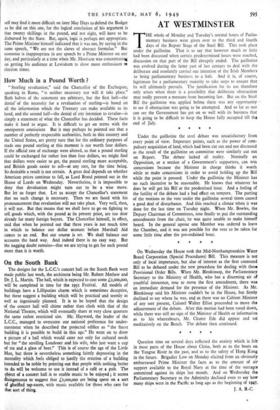AT WESTMINSTER
THE whole of Monday and Tuesday's normal hours of Parlia- • mentary business were given over to the third and fourth .
days of the Report Stage of the Steel Bill. This took place under the guillotine. That is to say that however much or little had been discussed when certain predetermined hours were reached, discussion on that part of the Bill abruptly ended. The guillotine was evolved during the latter part of last century to deal with the deliberate and resolutely carried out intention of the Irish Members to bring parliamentary business to a halt. And it is, of course, legitimate for a parliamentary majority to take steps to ensure that its will ultimately prevails. The justification for its use therefore only arises when there is a possibility that deliberate obstruction may really prevent a measure from becoming law. But on the Steel Bill the guillotine was applied before there was any opportunity to see if obstruction was going to be attempted. And so far as one can see the Government has got on so well with its business that it is going to be difficult to keep the House fully occupied till the end of July.
Under the guillotine the steel debate was unsatisfactory from every point of view. Important points, such as the power of com- pulsory acquisition of land, which had been cut out and not discussed as the result of the guillotine on committee were similarly cut out on Report. The debate lacked all reality. Normally an Opposition, or a section of a Government's supporters, can win concessions because the Minister in charge thinks it worth while to make concessions in order to avoid holding up the Bill while the point is pressed. Under the guillotine the Minister has no such incentive to be reasonable. He knows that whatever he does he will get his Bill at the predestined hour. And a feeling of the futility of the debate had a bad effect on tempers. The putting of the motions to the vote under the guillotine several times caused a good deal of disturbance. And this reached a climax when it was done for the last time on Tuesday night. When Mr. Bowles, the Deputy Chairman of Committees, rose finally to put the outstanding amendments from the chair, he was quite unable to make himself heard. In the general uproar one Member was ordered to leave the Chamber, and it was not possible for the vote to be taken for some little time after the pre-ordained hour.
On Wednesday the House took the Mid-Northamptonshire Water Board Corporation (Special Procedures) Bill. This measure is not only of local importance, but also of interest as the first contested Bill to be debated under the new procedure for dealing with these Provisional Order Bills. When Mr. Blenkinsop, the Parliamentary Secretary to the Ministry of Health, who has a disarming air of youthful innocence, rose to move the first amendment, there was an immediate demand for the presence of the Minister. As Mr. Blenkinsop said his Minister couldn't be in the House, but firmly declined to say where he was, and as there was no Cabinet Minister of any sort present, Colonel Walter Elliot proceeded to move the adjournment of the debate. After this motion had been voted down, while there was still no sign of the Minister of Health or information as to his whereabouts, Mr. Chuter Ede did appear and sat meditatively on the Bench. The debate then continued.
Question time on several days reflected the anxiety which is felt in most parts of the House about China, both as to the boats on the Yangtse River in the past, and as to the safety of Hong Kong in the future. Brigadier Low on Monday elicited from an obviously embarrassed Prime Minister the facts as to the amount of air support available to the Royal Navy at the time of the outrages committed against its ships last month. And on Wednesday the Parliamentary Secretary to the Admiralty declined even to say how many ships were in the Pacific as long ago as the beginning of 1947.
J. A. B.-C.






































 Previous page
Previous page